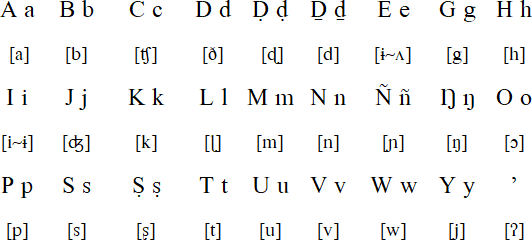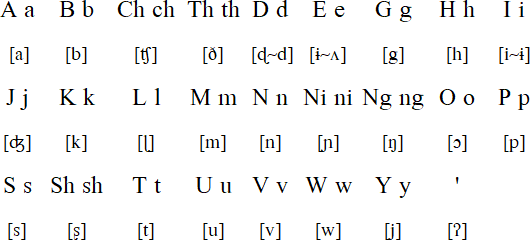Oʼodham is an Uto-Aztecan language spoken mainly in southern Arizona in the USA, and also in Sonora in northern Mexico. In 2007 there were about 14,000 speakers of Oʼodham in the USA, and there were about 110 speakers in Mexico in 2015. It is spoken mainly by adults and some children, and is still passed on from generation to generation in some families.
Oʼodham is also known as Tohono Oʼodham, Nebome, Nevome, Oʼothham, Papago-Pima, Tohono Oʼotham or Upper Piman. Native names for the language include Oʼodham ha-ñeʼokĭ, Oʼottham ha-neoki, and Oʼodham ñiok.
There are two main Oʼodham dialects: Tohono Oʼodham, formerly known as Papago, and Akimel Oʼodham, which is also known as Pima. They are largely mutually intelligilble, and each has a number of sub-dialects. There is also a Hia C-ed Oʼodham dialect, which is not well documented. Tohono Oʼodham means "the people of the desert", and Akimel Oʼodham means "the people of the river".
In the USA Oʼodham is the language of the following registered tribes: Ak Chin Indian Community of the Maricopa Indian Reservation, Gila River Indian Community of the Gila River Indian Reservation, Salt River Pima-Maricopa Indian Community of the Salt River Reservation, and the Tohono Oʼodham Nation of Arizona. Oʼodham is also officially recognised as one of the national languages of Mexico.
Oʼodham is taught in schools of the Tohono Oʼodham Nation, and also at the University of Arizona.
There are two main ways to write Oʼodham: the Alvarez-Hale orthography and the Saxton orthography, both were developed in the 1960s and 1970s. The former is used officially by the Tohono Oʼodham Nation and the Salt River Pima–Maricopa Indian Community. The latter is used officially by the Gila River Indian Community.


Download an alphabet chart for Oʼodham (Excel)
Ce:daghim 'o 'ab wu:sañhim.
To:tahim 'o 'ab wu:sañhim.
Cuckuhim 'o 'ab him.
Wepeghim 'o 'abai him.
Greenly they emerge.
In colors of blue they emerge
Whitely they emerge.
In colors of black they are coming.
Reddening, they are right here.
Na:nko Ma:s Cewagi/Cloud Song, by Ofelia Zepeda
Source: http://www.ncela.gwu.edu/pubs/stabilize/iii-families/zepeda.htm
Information about Oʼodham | Phrases | Numbers
Information about the Oʼodham people and language
http://en.wikipedia.org/wiki/Oʼodham_language
https://www.ethnologue.com/language/ood
http://www.native-languages.org/papago.htm
http://oodhamstuff.org/site/language/language.html
https://www.nps.gov/articles/oodham.htm
The Tohono Oʼodham Creation Story
http://www.hanksville.org/voyage/poems/Papagocreation.html
Comanche, Cora, Hopi, Huarijio, Huichol, Ivilyuat / Cahuilla, Kawaiisu, Luiseño, Mayo, Mono, O'odham, Nahuatl, Nahuatl (Eastern Huasteca), Nahuatl (Guerrero), Nahuatl (Tetelcingo), Nawat (Pipil), Northern Paiute, Serrano, Shoshone, Southern Paiute, Tarahumara, Tepehuán (Northern), Tepehuán (Southeastern), Tepehuán (Southwestern), Timbisha, Tongva, Yaqui
Languages written with the Latin alphabet
Page last modified: 14.07.21
[top]
You can support this site by Buying Me A Coffee, and if you like what you see on this page, you can use the buttons below to share it with people you know.

If you like this site and find it useful, you can support it by making a donation via PayPal or Patreon, or by contributing in other ways. Omniglot is how I make my living.
Note: all links on this site to Amazon.com, Amazon.co.uk
and Amazon.fr
are affiliate links. This means I earn a commission if you click on any of them and buy something. So by clicking on these links you can help to support this site.
[top]